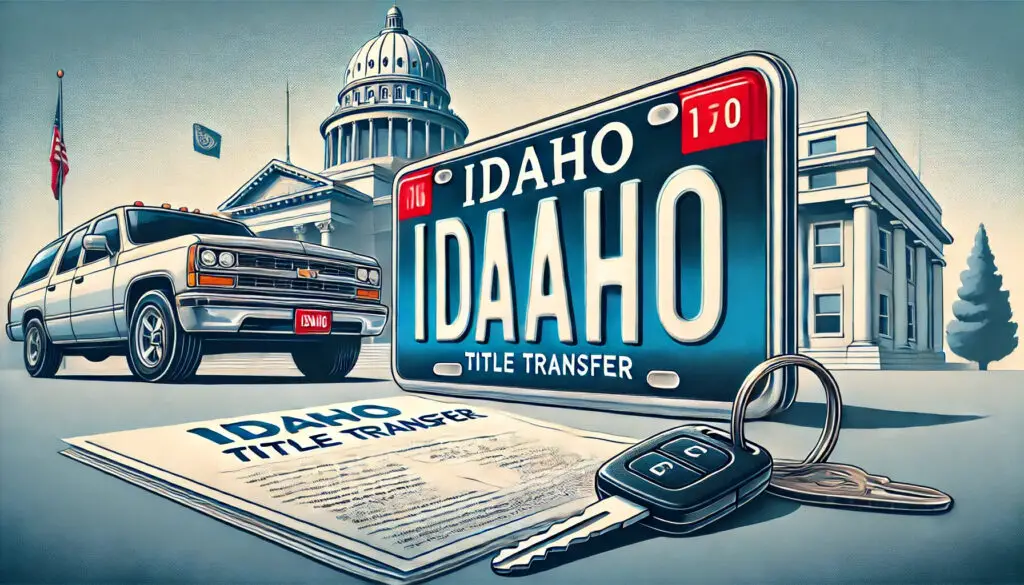Mastering the Alabama Title Transfer Process: The Ultimate Guide
Transferring a vehicle title in Alabama is a crucial legal process that ensures proper ownership and registration. Whether you’re buying, selling, or inheriting a vehicle, understanding the steps and requirements involved is essential. This comprehensive guide provides all the details necessary to navigate the Alabama title transfer process smoothly and accurately.
What is a Title Transfer?
A title transfer is the legal process of changing vehicle ownership from one party to another. It involves updating the official records to reflect the new owner, ensuring compliance with Alabama state laws.
Why is Title Transfer Important in Alabama?
Title transfers are legally required whenever a vehicle changes ownership. They protect both buyers and sellers by documenting the transaction, verifying ownership, and preventing potential disputes or fraud. A properly executed title transfer also ensures the vehicle is registered under the new owner’s name.
Understanding Alabama Title Transfer Laws
Alabama’s title transfer laws are designed to ensure clear ownership and adherence to state regulations. Key points include:
- Timely Transfers: Title transfers must be completed within 20 days of the sale to avoid penalties.
- Insurance Requirements: Current liability insurance is mandatory.
- Fees and Taxes: Title transfer fees and applicable sales tax must be paid at the time of registration.
Step-by-Step Guide to Alabama Title Transfers
1. Gather Required Documents
The following documents are essential for a successful title transfer:
- Original Title: Properly assigned by the seller.
- Bill of Sale: Includes purchase price, buyer and seller details, and signatures.
- Proof of Insurance: A valid Alabama liability insurance policy.
- Driver’s License: A current Alabama driver’s license.
- Payment: Title transfer fee ($15) and applicable sales tax.
2. Completing the Title Transfer
Both the buyer and seller must collaborate to complete the following:
- Sign the Title: Both parties must sign the title in the designated sections.
- Application Forms: Fill out the necessary forms provided by the county license office.
3. Visit Your Local County License Office
Take all required documents to your county license office. Ensure the paperwork is complete to avoid delays.
4. Pay Fees and Taxes
- Title Transfer Fee: $15.
- Sales Tax: Varies based on the vehicle’s purchase price and local tax rates.
5. Receive New Title and Registration
Upon completing the process, you will receive a new title and registration for the vehicle.
Special Situations in Title Transfers
Inherited Vehicles
When inheriting a vehicle, the executor of the estate must provide:
- A copy of the death certificate.
- Letters of administration or probate documents.
- The original title signed by the executor.
Out-of-State Vehicles
Transferring an out-of-state title requires:
- A certified copy of the current title.
- Proof of VIN inspection.
- Payment of applicable Alabama taxes and fees.
Divorce or Separation
For vehicles awarded during divorce, provide:
- A court order or divorce decree.
- The original title signed by the transferring party.
Common Issues and How to Avoid Them
- Incomplete Paperwork: Double-check all forms and signatures.
- Outstanding Liens: Ensure liens are satisfied and released before the transfer.
- Fraudulent Titles: Verify the title’s authenticity and accuracy.
Digital Title Transfers in Alabama
Alabama’s electronic title system simplifies the process:
- Benefits: Faster processing, reduced paperwork, and enhanced accuracy.
- How to Use: Visit the Alabama Department of Revenue website to initiate digital transfers.
Fees and Taxes Associated with Title Transfers
Title Transfer Fee
The standard fee for title transfers is $15.
Vehicle Sales Tax Rates
- Rates vary depending on the county and vehicle purchase price.
- Some counties may impose additional local taxes.
Penalties for Late Transfers
Failure to transfer a title within the required timeframe may result in fines and delays in registration.
Alabama DMV: Your Title Transfer Partner
- Find Your Local DMV: Visit ALEA to locate your nearest office.
- Contact Information: Offices typically operate Monday through Friday during business hours.
- Services Offered: Title issuance, registration, VIN inspections, and lien recording.
FAQs About Alabama Title Transfers
1. What Happens if I Don’t Transfer the Title on Time?
You may face penalties, fines, and possible legal complications.
2. Can I Transfer a Title Without the Buyer or Seller Present?
No, both parties must sign the title to complete the transfer.
3. What Should I Do if the Title is Lost or Damaged?
Apply for a duplicate title through the Alabama Department of Revenue.
4. How Do I Transfer a Title for a Salvaged Vehicle?
Provide the salvage title and necessary inspection documents.
5. Are Title Transfers Required for Gifted Vehicles?
Yes, complete the transfer with a gift affidavit and required documents.
Summary of the Title Transfer Process
- Collect required documents.
- Complete the title transfer and application forms.
- Visit your county license office.
- Pay applicable fees and taxes.
- Receive your new title and registration.
By following these steps and understanding Alabama’s requirements, you can ensure a smooth and legal transfer of vehicle ownership. For the most accurate and up-to-date information, contact your local county license office or visit the official ALEA website.
Additional Tips for a Smooth Alabama Title Transfer Process
Verify Vehicle Information
Before proceeding with the title transfer, verify that all vehicle information on the title matches the vehicle being sold or transferred. This includes:
- Vehicle Identification Number (VIN): Ensure the VIN on the title matches the VIN on the vehicle.
- Odometer Reading: Record and verify the odometer reading on the title at the time of sale.
- Model and Year: Confirm that the make, model, and year listed are accurate.
Handle Liens Properly
If the vehicle has an existing lien, ensure it is resolved before the transfer. This process typically involves:
- Paying Off the Loan: Work with the lienholder to satisfy the remaining balance.
- Lien Release: Obtain a lien release document or a stamped title showing the lien has been cleared.
Failure to address liens can delay the transfer process and result in legal complications.
Check Local County Requirements
Some counties in Alabama may have specific procedures or additional requirements for title transfers. Contact your local county license office to confirm details such as:
- Accepted forms of payment.
- Operating hours and appointment requirements.
- Any additional forms or documents needed.
Digital Tools to Simplify the Process
Alabama Electronic Title Application
The Alabama Department of Revenue offers online tools to streamline title transfers. Using these digital services provides benefits such as:
- Time Efficiency: Avoid long wait times at the county office.
- Paperless Process: Submit forms and payments electronically.
- Instant Confirmation: Receive digital proof of submission immediately.
To access these tools, visit the official Alabama Department of Revenue website.
Key Takeaways for Vehicle Sellers
If you’re selling a vehicle, follow these best practices to ensure a seamless transaction:
- Prepare the Title: Complete the seller section of the title, including signatures and the date of sale.
- Remove Personal Information: Ensure your personal details, such as registration plates, are removed from the vehicle before handing it over.
- Provide a Bill of Sale: Give the buyer a detailed, signed bill of sale for their records.
Key Takeaways for Vehicle Buyers
Buyers should follow these steps to protect their investment and avoid legal issues:
- Inspect the Title: Ensure the title is properly assigned by the seller and free of errors.
- Check for Liens: Confirm that no liens are listed on the title unless they have been resolved.
- Complete Registration Promptly: Register the vehicle within 20 days to avoid penalties.
Frequently Asked Scenarios in Alabama Title Transfers
1. What If the Vehicle Has Multiple Owners?
If the title lists multiple owners, all owners must sign the title unless specified otherwise (e.g., “OR” between names indicates that only one owner needs to sign).
2. Can I Transfer a Title If I Don’t Have Insurance Yet?
No, Alabama law requires proof of liability insurance before the title transfer process can be completed.
3. How Do I Transfer a Title for a Leased Vehicle?
For leased vehicles, the leasing company must sign over the title. Additional paperwork may be required to confirm the end of the lease agreement.
Avoiding Common Title Transfer Mistakes
1. Skipping the Notary (If Required)
While Alabama doesn’t always require notarization for title transfers, some documents (e.g., power of attorney forms) may need a notary’s signature. Double-check requirements for special cases.
2. Delaying the Process
Transferring a title promptly ensures compliance with state laws and avoids penalties.
3. Incomplete Bill of Sale
An incomplete or vague bill of sale can lead to disputes. Include all necessary details, such as:
- Vehicle description (make, model, VIN).
- Purchase price.
- Seller and buyer contact information.
How to Correct Errors on a Title
If you discover an error on the title, such as a misspelled name or incorrect VIN, take the following steps:
- Contact the Seller: Work together to correct the issue.
- Submit a Correction Form: Visit your local county license office with supporting documents.
- Pay Correction Fees: Fees may vary depending on the nature of the correction.
The Role of Alabama DMV in Title Transfers
The Alabama Department of Motor Vehicles (DMV) provides support for:
- Title issuance and replacement.
- Registration renewals.
- Addressing title disputes and errors.
Visit the DMV website or contact your local office for assistance.
Conclusion
Transferring a vehicle title in Alabama is a straightforward process when you follow the outlined steps. Whether you are a buyer or seller, preparation, accuracy, and timeliness are key to ensuring a smooth transaction. By gathering the necessary documents, resolving liens, and adhering to state laws, you can avoid common pitfalls and complete the transfer efficiently.
For the latest updates and requirements, consult the Alabama Department of Revenue or your local county license office. Following these guidelines will protect your rights and ensure compliance with Alabama’s vehicle ownership regulations.









